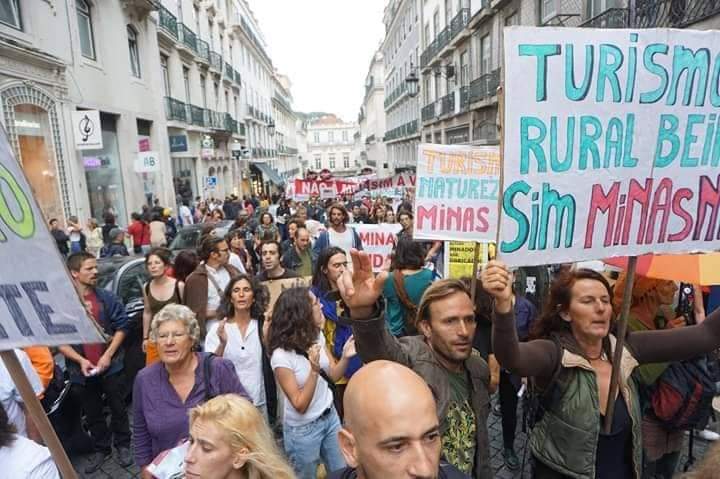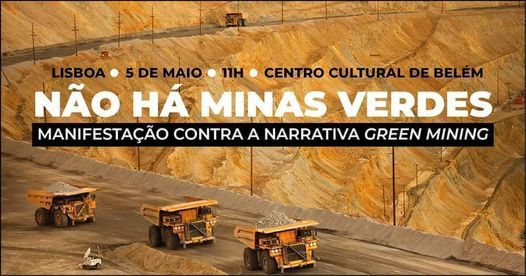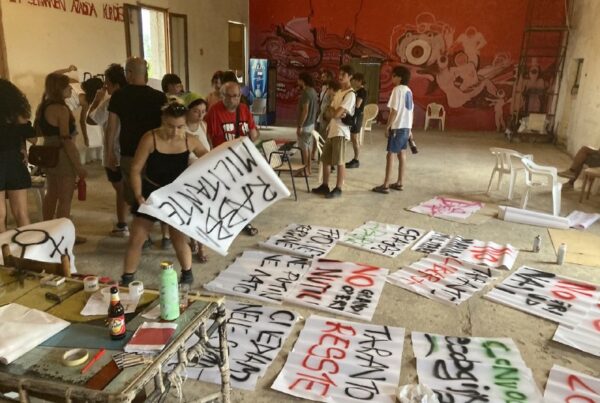By Francisco Venes and Stefania Barca, with Anna Mandorli, Ben Witte, Eva Sievers, Laure Remmerswaal, Noor Evers, and Victor Peet.
An interview with political ecologists Francisco Venes and Stefania Barca explores debates around lithium mining in Portugal
In academic and public discourse on the topic of climate change mitigation, electric cars are often hailed as an innovative solution for decarbonization of transport. Yet scholars, journalists and activists have increasingly questioned this narrative, pointing to the socio-environmental contradictions of these technologies. For instance, in a recent article in The Guardian, Oliver Balch spoke of them as ‘dirty’ and a ‘curse’. He was referring to the material requirements of electric vehicles, highlighting one critical metal: the lithium used for their rechargeable batteries due to its low density.
Currently, the European Union imports all of its lithium, mainly from Chile (78%), the United States (8%) and Russia (4%). European Commission Vice-President M. Šefčovič has stated the EU’s ambition to change this and become 80% self-sufficient in lithium production by 2025, even though not everyone agrees with this choice. As the EU’s largest lithium reserve, the Portuguese government has jumped on the economic opportunity of this ‘white gold’. Between 2016 and June 2019, fifty prospecting requests were made for lithium with exploration requests currently spanning over 10% of Portuguese territory. Local communities do not share this enthusiasm broadly: more than fifteen anti-mining groups have sprung up to protest its impacts on the environment, landscape and livelihoods.
This complex trade-off gripped us. As students of the Masters in Governance of Sustainability at Leiden University, we were tasked with writing a simulated research consultancy report as part of an 8-week course on climate change and the energy transition. Thus, we formulated the research question: “Should lithium be mined in Portugal? And if so, how can this be done most sustainably?” We decided to turn this question to experts and activists in Portugal, and so we reached out to Stefania Barca and Francico Venes, political ecology scholars from the Center for Social Studies at the University of Coimbra. What follows is the result of our exchange.
What is your overall position towards lithium mining in Portugal? What are the most important advantages and disadvantages?
Our position is contrary to large-scale mining projects, regardless of the minerals being extracted and of the country where they take place. This is not a problem affecting Portugal or lithium mining exclusively. Medium and large-scale mines have profound negative impacts for human beings and non-human nature, mostly in the areas nearby mining sites, but also far from them. The question about advantages and disadvantages must first address another question: advantages and disadvantages for whom?
Debates on mining activities usually assume some aspects instead of debating them. One of these is demand for mineral resources: there is a demand – for example, for spodumene, which contains lithium – therefore we need to proceed with mining. We seldom try to understand the composition or the pertinence of current and future demand.
Let’s focus on lithium. We start from the assumption that we need to transition from combustion engines – which run on fossil fuels – to batteries that store electricity. And in order for that transition to happen, there is going to be (in fact, it is already happening) a significant rise in the demand for minerals containing lithium. However, if we see the problem from a different perspective, one which isn’t centred on private vehicles as the paradigm for mobility in a zero-emission society, we probably wouldn’t be having this debate.
There would still be a demand for lithium minerals, of course. However, demand would be much lower as well as the current requirement for new supply sources. The idea that we need to start digging as much lithium as we can in order to tackle CO2 emissions is one which sees the changes ahead of us merely as technological transitions, and do not aim at more profound transformations in society. Unfortunately, this perspective seems to be the one driving the European Union’s (EU) sustainable mobility policy, as well as its Mineral Policy.
So, who sees advantages in this lithium rush in Portugal? The mining companies that buy concessions and try to turn them into economically viable projects. There is a considerable profit to be made. The European car industry, which needs to transition into electric vehicles in the near future because it wants to maintain the same level of demand for its products. Professionals related to the mining sector who see these projects as an income opportunity.
Who loses? First of all, communities who live close to mining projects. There is a tendency to say lithium ore extraction does not have as many impacts as, for example, gold ore extraction. However, solid rock extraction presupposes, in both cases, the removal of enormous quantities of solid materials where the concentration of the desired mineral can be as low as 1% (or even lower). Problems associated with noise and dust pollution, with landscape transformation, high water consumption, perturbations to underground and surface water ecosystems, increased traffic, are all there, regardless of the type of mineral.
There is also the fact that medium and large-scale mineral activities are capital-intensive instead of labour-intensive. This means their potential for creating jobs is limited, both in number and in duration. Companies often claim they will establish strong ties with previously existing sources of livelihood and local economies. Other research and our own experience shows this is seldom the case, since mining projects tend to develop enclave dynamics.
However, let’s assume there is an effort to contradict that tendency and the companies do build these ties. This should not be seen as something desirable. Why? Because they would require local services that would last, at most, during the life span of a project, which is not more than 15-20 years. It is highly irresponsible to claim a mine will bring economic development and help counter demographic decline tendencies when what you’re doing is promoting short-term opportunities for local providers. It is not the mining company that will have to deal with the consequences the end of the project will have for local economies, it’s local stakeholders. Also, local communities would not only lose from the impacts on areas that are today essential for their livelihoods, but also from the destruction of local resources necessary to build long-term economic opportunities.
Second, governments are assuming the responsibility for reparation in case something does not go according to plan. It is true companies must include mitigation and some reparation costs in their operation budget. But if something happens outside of predicted scenarios – and it often does – these budgets won’t cover even a fraction of the costs for minimally repairing the damage. And here we are assuming we can translate all damage into a monetary sum, which is a very weak assumption. We need to consider the values at stake here are incommensurable.

Protest in Lisbon, September 2019, against the prospecting for lithium mining. Protesters demand tourism and nature, no mines. Picture by “Unidos em Defesa de (United in Defense of) Covas do Barroso” association.
How do you evaluate the trade-offs related to lithium mining?
Again, trade-offs for whom? The only possible common interest here would be the need to drastically reduce CO2 emissions. As we’ve discussed before, this is a false argument to justify expanding the supply of lithium minerals. Moreover, we would enter a very dangerous path if we accepted that climate change policies should be carried at the cost of creating new sacrifice zones.
The argument of national interest, that all of us need to be part of the effort, is very easy to use when you’re not the one being asked to do the effort – when you are not part of the “frontline communities” who have systematically borne the costs of extractive activities. And it is particularly perverse to demand such effort from those who are less responsible for climate change. The only possible path for climate justice is one that takes seriously the issue of social justice. And there is no social justice when you force populations to live nearby medium- and large-scale mining operations. There is no ‘win-win’ scenario.
Do you think it’s possible to mine Portuguese lithium in a sustainable way? If so, how?
No. There is no such thing as ‘green mining’, ‘sustainable mining’ or ‘responsible mining’. We’re in the realm of corporate propaganda when we bring up these slogans. They do not have any basis in science, nor in the experience of the people living with mining projects. In Portugal, the most recent law on mining activities states they must obey the principles of ‘green mining’. However, the law does not state which these principles are, or who determines them.
Companies usually claim three aspects of these ‘responsible’ practices: a) they will use the best technology available to minimize impacts; b) they will follow the best practices in environmental laws and regulation, being even stricter than presumably weaker national regulations; c) they will have the best interest of local populations at heart. This idea that technology can solve most of the negative environmental impacts is wrong. If we look at company claims in terms of reparation and prevention, we see a paradigm of compartmentalization of living systems instead of one that acknowledges the complexity of what is being profoundly changed. It is in acknowledging the complexity of these ecosystems that the possibility for ‘unexpected’ events may be taken into consideration. And we put the unexpected between quotation marks because they are more common than companies would like to admit.
Then you have regulations. One common argument in countries like Portugal – which is part of the EU – is that you can’t compare the regulatory context to what happens, for example, in South America. The idea goes: ‘we have stricter regulations than those countries, more capacity to enforce them, and more mechanisms for people to express their concerns’. Sometimes, these claims are simplistic generalizations on the reality of these countries, not facts. For example, in certain aspects, environmental and participation laws in Ecuador or Bolivia can be more thorough than in Portugal.
Mining legislation in Ecuador distinguishes between initial and advanced prospective activities, and it requires an Environmental Impact Assessment (EIA) for advanced prospective activities in larger projects (when the estimated production volume is higher than a preset quantity), an environmental management plan and yearly audits to project operations. The most recent regulation of the Portuguese Mining Law does not even mention this possibility. It is true the environmental impacts of prospective activities are much lower than in the extraction phase, but they still exist. And let’s not forget about the social impacts, which start the moment populations realize a mining project is arriving at their doorstep.
In the case of Mina do Barroso, in Northern Portugal, if there had been an EIA for the prospective phase – which would have included a description of prospective procedures – local stakeholders would have been previously informed about what was going to happen. Moreover, the promoter would have had to be more open about its intentions for the future. The idea, often spread in webinars and social media discussions by some geologists, that there isn’t any relationship between prospective works and extraction, that the former is done only for the sake of knowing ‘what’s there’, is misleading. No company will invest in prospecting if it does not intend to extract the mineral in the future. At that moment, it already has a fair idea of what it plans to do.
Then you have regulatory authorities and the issue of transparency. It has been hard for local stakeholders to access information on lithium projects, and you see a dangerous proximity between regulators and mining industry actors, as shown in last week’s Green Mining conference. This is often public and promoted at the EU level. Even though it is not strictly about regulation enforcement it is important to mention that the EIA loses credibility as an adequate mechanism to assess risk because the company in charge of the study works directly for the project’s promoter. This is not an issue exclusive to mining or to the Portuguese reality. Nonetheless, it’s hard to claim objectivity when you’re being paid by those who want the project to proceed and when you know that if you start emitting negative assessments, you probably won’t be hired in the future.

“There are no green mines” protest in Lisbon, 5 of May 2021, on the day of the European “Green Mining Conference” organized by the Portuguese government.
Finally, you have this idea of putting the interest of local populations first. In fact, it’s the other way around: mining companies want to extract profits from the concession they bought and invested in. And they know they need to have the people on their side if things are going to run smoothly. Resistance may leave some investors uncomfortable – some may even withdraw – and will certainly increase company operational costs. That is why it is so important for companies to obtain what they call the Social License to Operate (SLO). Here is a concept that has been well studied and developed in the specialized literature, even though most authors tend to assume the projects’ implementation as given. They often work from the standpoint of Corporate Social Responsibility and focus on how companies can improve their legitimacy strategies, therefore assuming the management of conflict as a ‘desirable’ outcome. On the contrary, political ecologists adopt a more critical perspective on SLO strategies, often highlighting its violent nature.
We acknowledge conflict may have negative consequences for local communities, but is also our perspective that conflict itself is the desirable outcome of a project’s implementation because it evidences the deep contradictions between mining activities and people’s livelihoods. Additionally, projects such as The Environmental Justice Atlas or The Latin American Observatory on Mining Conflicts (OCMAL) show that mining conflicts are common. They also evidence many aspects of company strategies to obtain acceptance through fear and violence that we usually don’t find in the SLO literature. What the company can do to ‘buy’ the locals acquiescence varies with context, but many practices are common to different settings.
What are the key stakeholders involved in, or affected by, Portuguese lithium mining?
There are many stakeholders involved. First the mining companies: Savannah Resources in Mina do Barroso (Boticas municipality), Lusorecursos in Mina do Romano (Montalegre) and PANNN (Argemela). More will join them if the government goes ahead with the bidding of new areas for prospective activities. Then you have mining interest associations, such as the Portugal Mineral Resources Cluster, where some of these companies ‘meet’ other lithium mining supporters from universities and governmental institutions. They represent the mining lobby in the country and have recently written an open letter to the government in support of lithium mining.
Another promoter is the central government, mainly through the Environment and Energy Transition Ministry. One key actor within the government who supports the Portuguese Lithium Strategy is the Secretary of State for Energy Policies, Mr. João Galamba. Some mainstream environmentalist groups have had a somewhat ambiguous position on the lithium policy. The environmental NGO Quercus, for example, expressed its support to local populations opposing lithium mining, while also signing a Memorandum of Understanding with the previously described Portugal Mineral Resources Cluster. The Climate Justice movement – through groups such as Climáximo – have had a more consistent perspective, arguing that the Portuguese lithium policy goes in a wrong direction in terms of tackling CO2 emissions.
At the same time, few political parties have expressed a coherent position regarding the Lithium Strategy in the Portuguese parliament. The only exception has been the Green Party (Partido Ecologista os Verdes), whose deputies have been vocal in their opposition. Then you have local resistance in all three areas where prospective activities have been carried out – Boticas, Montalegre and Argemela – and every region where the government wants to attribute new concessions. These mobilizations are very recent, no more than three or four years, which is a short period if we compare it with the lifespan of many mining conflicts throughout the globe. However, they have achieved a lot, mainly by drawing the attention of media, legislators and the public to a policy that was being ‘cooked’ behind the back of local populations.
For example, when Savannah Resources and Lusorecursos started digging holes in Boticas and Montalegre (respectively), people still didn’t know the purpose of the prospective activities being carried out in their lands. This is why people in the Covas do Barroso parish (Mina do Barroso, Boticas) have prohibited Savannah from drilling new holes in communal and public lands. When they accidentally discovered what the plans for Mina do Barroso were, they were appalled. Today, the overwhelming majority of the population in the parish (formed by three villages, one of them at merely 200-300 meters from one the proposed digging sites) opposes the project. Two years ago, they formed an association called United in Defense of Covas do Barroso (Unidos em Defesa de Covas do Barroso) in order to fight the project.
It is strikingly contradictory that two of the projects – in Boticas and Montalegre – are located in a region the Food and Agriculture Organization (FAO) has recognised as a Globally Important Agricultural Heritage System (GIAHS), “outstanding landscapes of aesthetic beauty that combine agricultural biodiversity, resilient ecosystems and a valuable cultural heritage.” It is the only place in Portugal that has received this classification and the government risks compromising it (and the livelihoods of those who make it possible for this place to exist) by giving priority to an extractivist policy.

Poster for protest in Lisbon, September 2019, against the prospecting for lithium mining. “No to the mine. Barroso World Agricultural Heritage”. Art by “Unidos em Defesa de (United in Defense of) Covas do Barroso” association.
Do you have any more thoughts or information to add on this topic?
A further consideration is warranted with regard to the broader social context of opposition to lithium mining in Portugal. In the above mentioned Guardian article, the country is depicted as one with a weak environmental movement, a statement based on the fact that it is ‘one of the few countries in Europe not to have a Greenpeace affiliate’, and that ‘according to an EU survey, of all European consumers, the Portuguese are the least likely to pay more for eco-branded products’. Now, such a shallow definition of what environmentalism is about won’t take us far in understanding what is at stake here.
To begin with, Portugal might not have Greenpeace, but since when is this the universal harbinger of environmentalism? The country has a long list of environmental organizations, from large NGOs to grassroots groups, often connected through nation-wide networks, most of which were born during the transition to democracy after 1974 – with some opposition groups notably going back to the previous dictatorship decades. Many of these groups have been engaged in resisting extractivism and other developmental projects to protect both urban and rural environments and preserve resources and possibilities for alternative life projects.
Moreover, equating environmentalism with green consumerism is a reductive and problematic assumption for at least two reasons: not only is ‘green consumption’ seldom more than a purely fictitious market fix, but this arbitrarily excludes low-income people (i.e. much of the Portuguese population) from access to the category of ‘environmentalists’.
Top (Profile) image shows the colourful painting saying BARROSO IS THE ONE THAT IS GREEN (VERDE É O BARROSO) made in Covas for the protest against the false narrative of “green mining”, 5th of May 2021, Lisbon. Photo by ‘Guilhotina.info’ .
Victor Peet (BSc) is a Dutch MSc Governance of Sustainability (Leiden University) student with a background in International Relations and Geo-resources for the Future.
Eva Sievers (BSc) is a German MSc Governance of Sustainability (Leiden University) student with a background in Physical and Human Geography.
Ben Witte (BSc) is a Dutch MSc Governance of Sustainability (Leiden University) student with a background in Organisation Studies and ‘Wicked Problem’ analysis
Anna Mandorli (BSc) is an Italian MSc Governance of Sustainability (Leiden University) student with a background in Political Science and International Relations
Laure Remmerswaal (BSc) is a Dutch MSc Biology – Biodiversity and Sustainability student (Leiden University) with a background in Biology
Noor Evers (BSc) is a Dutch MSc Governance of Sustainability (Leiden University) student with a background in Political Ecology and International Relations
Stefania Barca is a Senior Researcher and member of the Ecology and Society Workshop (ECOSOC) at the Center for Social Studies, University of Coimbra
Francisco Venes is a PhD Student and member of the Ecology and Society Workshop (ECOSOC) at the Center for Social Studies, University of Coimbra







4 Comments